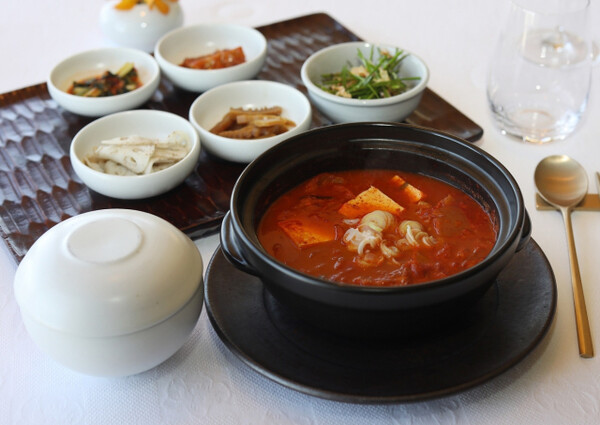Targeting Exports to Six Countries Including U.S., Japan, and Vietnam

Lotte Hotel & Resort is accelerating its kimchi business expansion and has newly introduced a home meal replacement (HMR) kimchi stew. The strategy is to leverage its global chain to start full-scale overseas exports from next year.
On Sept. 11, Lotte Hotel held a press conference to announce the launch of the hotel's kimchi stew HMR at Lotte Hotel Seoul, introducing a lineup of kimchi dish convenience foods including kimchi stew. This product is an expansion two years after the introduction of “Lotte Hotel Kimchi” in August 2023, and the company is also working on broadening the product line to include stir-fried kimchi and braised kimchi.
In the past, Lotte Hotel attempted to enter the kimchi market in 2013 and 2016 but withdrew. Internal evaluations suggest that lack of preparation and product competitiveness were the limitations at the time. However, last year, they made another strategic move by introducing kimchi with Lotte Hotel’s unique recipe and know-how. Lee Sung-ho, head of Lotte Hotel’s Commerce Business Team, emphasized, “We judged that there is great potential when consumer trust combines with hotel quality control,” adding, “This time, we aim for the top position in the industry.”
The newly launched “Lotte Hotel Kimchi Stew” is characterized by the use of 100% domestic pork shoulder, red pepper powder from Yeongyang, North Gyeongsang Province, and premium salted seafood. Instead of artificial flavoring, natural ingredients such as yellow croaker jeotgal, meat jeotgal, hydrangea leaf tea, pear, yellow pollack, and sand shrimp were added to create a deep flavor. Consumers reportedly responded immediately after the launch, saying “It doesn’t taste like store-bought kimchi stew,” “The broth is rich,” and “The meat has no odor.” The product is sold in 600g portions, which is larger than regular convenience foods, and is priced at 48,000 won for a set of 4 packs.
Lotte Hotel is also putting effort into quality control. They directly check the sweetness and salinity with each production period and undergo hygiene inspections by the hotel’s food safety team every two months. Another differentiating point is that a Korean cuisine chef with over 40 years of experience is stationed at the production facility and participates in the entire process. Kimchi business sales grew by 20% year-on-year from January to August this year, proving market potential.
Global expansion is also being accelerated. Lotte Hotel plans to prioritize six countries where hotel chains operate, including Japan, Vietnam, and the United States, and expand distribution networks in collaboration with affiliates. However, due to different meat export regulations in each country, the export procedures for kimchi stew will be reviewed separately. Kim Beom-seok, head of Marketing at Hotel Lotte, explained, “The biggest competitive edge of Lotte Hotel Kimchi is its strict adherence to domestic ingredients,” adding, “For the red pepper powder, which is the core of kimchi, we only use red pepper powder harvested from fields in Yeongyang and directly managed by the hotel.” He further stated, “We will continue to expand our premium kimchi lineup to match consumer lifestyles.”



